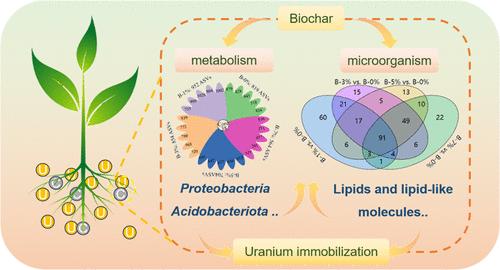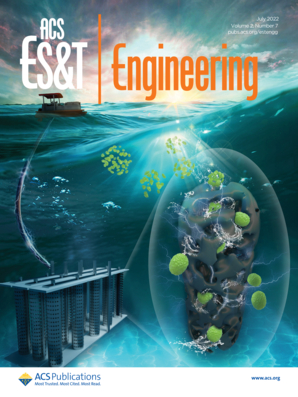生物炭添加量对铀胁迫土壤修复的影响:来自 16S rDNA 和代谢组学的证据
IF 7.4
Q1 ENGINEERING, ENVIRONMENTAL
引用次数: 0
摘要
添加土壤改良剂以促进植物修复受放射性核素污染的土壤被认为是一种很有前景的方法。在这里,我们测试了不同含量的生物炭,以帮助盆栽植物净化受铀污染的土壤。添加 1%的生物炭在去活铀、提高土壤酶活性和促进黑麦草生长方面效果最佳。微生物学和代谢组学分析进一步显示,1 wt % 的生物炭显著提高了放线菌群和粘球菌群等微生物的丰度,并加速了脂类和类脂分子、有机酸及其衍生物和有机氧化合物等差异代谢产物的产生。对生物和非生物相互作用网络的分析表明,细菌、酶和代谢物之间的协调相互作用显著提高了 ABC 转运体代谢途径的表达水平。这增强了活细胞对铀的抵抗力,维持了铀胁迫下的系统平衡。这项研究为生物炭辅助植物修复技术的应用提供了一个实例,并为放射性核素污染土壤的修复提供了理论指导。本文章由计算机程序翻译,如有差异,请以英文原文为准。

Impact of Biochar Addition Levels on Remediation of Uranium-Stressed Soil: Evidence from 16S rDNA and Metabolomics
The addition of soil amendments to facilitate plant-based remediation of soil contaminated with radioactive nuclides is considered a promising approach. Here, we tested different levels of biochar to help clean uranium-contaminated soil in the potted plants. Adding 1% biochar had the best results in deactivating uranium, increasing soil enzyme activity, and promoting ryegrass growth. Microbiological and metabolomic analysis further revealed that 1 wt % biochar significantly enhanced the abundance of microorganisms such as Actinobacteriota and Myxococcota and accelerated the production of differential metabolites such as lipids and lipid-like molecules, organic acids and derivatives, and organic oxygen compounds. The analysis of biological and nonbiological interaction networks indicates that the coordinated interaction between bacteria, enzymes, and metabolites significantly improves the expression level of the ABC transporter’s metabolic pathway. This enhances the resistance of living cells to uranium and maintains system homeostasis under uranium stress. This study provides an example of the application of biochar-assisted phytoremediation and offers theoretical guidance for the remediation of soil contaminated with radioactive nuclides.
求助全文
通过发布文献求助,成功后即可免费获取论文全文。
去求助
来源期刊

ACS ES&T engineering
ENGINEERING, ENVIRONMENTAL-
CiteScore
8.50
自引率
0.00%
发文量
0
期刊介绍:
ACS ES&T Engineering publishes impactful research and review articles across all realms of environmental technology and engineering, employing a rigorous peer-review process. As a specialized journal, it aims to provide an international platform for research and innovation, inviting contributions on materials technologies, processes, data analytics, and engineering systems that can effectively manage, protect, and remediate air, water, and soil quality, as well as treat wastes and recover resources.
The journal encourages research that supports informed decision-making within complex engineered systems and is grounded in mechanistic science and analytics, describing intricate environmental engineering systems. It considers papers presenting novel advancements, spanning from laboratory discovery to field-based application. However, case or demonstration studies lacking significant scientific advancements and technological innovations are not within its scope.
Contributions containing experimental and/or theoretical methods, rooted in engineering principles and integrated with knowledge from other disciplines, are welcomed.
 求助内容:
求助内容: 应助结果提醒方式:
应助结果提醒方式:


